ChatGPT now has 800+ million weekly active users. That’s more than the population of Europe—and they’re not typing keywords into Google. They’re asking questions, getting synthesized answers, and making decisions without ever clicking a search result. [Source: TechCrunch]
The $80 billion SEO industry just cracked. [Source: Andreessen Horowitz]
If your content strategy is still built around ranking in Google’s ten blue links, you’re optimizing for a world that’s rapidly disappearing. The question is no longer whether AI will transform search—it’s whether you’ll be visible when it does.
This guide will walk you through everything you need to know about Generative Engine Optimization (GEO)—from its academic origins to actionable strategies you can implement today. You’ll learn how AI engines select sources, why traditional SEO tactics often fail in generative search, and how to measure success in this new paradigm. Whether you’re a marketer, content creator, or business owner, this is your roadmap to visibility in the age of AI search.

What Is Generative Engine Optimization?
Generative Engine Optimization (GEO) is the practice of optimizing digital content to achieve favorable visibility, accurate representation, and preferential citation in AI-generated search responses. Unlike traditional SEO, which focuses on ranking in search engine results pages (SERPs), GEO ensures your brand appears prominently when AI systems synthesize information to answer user queries.
When someone asks ChatGPT, Perplexity, Claude, or Google’s AI Mode a question about your industry, GEO determines whether your content influences the answer—and whether you receive attribution for it.
Think of the distinction this way: SEO gets you clicked; GEO gets you quoted.
Traditional search engines return a list of links and let users decide which to visit. Generative engines synthesize information from multiple sources into a single, conversational response. Your content doesn’t just need to rank—it needs to be compelling enough for an AI to extract, cite, and present to users as authoritative information.
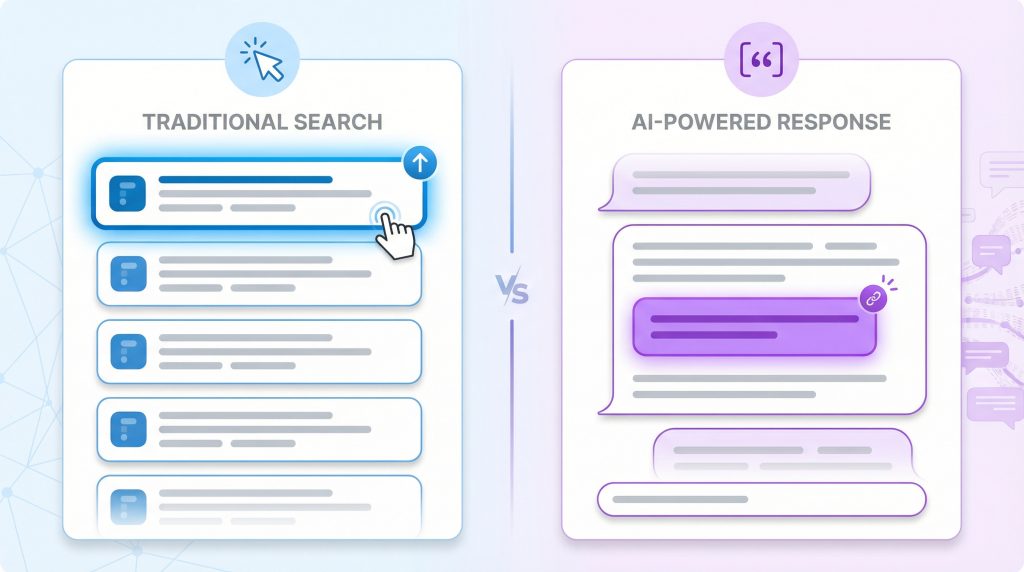
The Origin of GEO
The term “Generative Engine Optimization” was formally introduced in a groundbreaking research paper published in November 2023 by researchers from Princeton University, Georgia Tech, The Allen Institute for AI, and IIT Delhi. The study, titled “GEO: Generative Engine Optimization” and authored by Pranjal Aggarwal, Vishvak Murahari, Tanmay Rajpurohit, Ashwin Kalyan, Karthik Narasimhan, and Ameet Deshpande, established the first academic framework for understanding how content creators can improve visibility in AI-generated responses. [Source: Princeton University/arXiv]
The researchers introduced GEO-bench, a comprehensive benchmark of 10,000 diverse user queries across nine datasets, allowing systematic evaluation of optimization strategies. Their findings were significant: GEO techniques can boost content visibility in generative engine responses by 30-40%. [Source: Aggarwal et al., 2023]

The paper identified nine specific optimization methods, with Statistics Addition, Cite Sources, and Quotation Addition showing the strongest performance improvements. Crucially, the study found that traditional SEO tactics like keyword stuffing performed poorly in generative contexts—a finding that has profound implications for content strategists.
The research was later presented at KDD 2024 (the 30th ACM SIGKDD Conference on Knowledge Discovery and Data Mining), cementing GEO’s place as a legitimate field of academic study and practical application.
Why GEO Matters in 2026: The Data Behind the Shift
The transition from traditional search to AI-powered discovery isn’t a gradual shift—it’s a seismic change already underway. Here’s the data that should concern every marketer:
User Adoption Has Exploded
- ChatGPT reached 800+ million weekly active users by late 2025, doubling from 400 million in just months. [Source: TechCrunch]
- Perplexity AI processed 780 million queries in May 2025 alone, up from 230 million in August 2024—a 239% increase in less than a year. [Source: Perplexity]
- Google’s AI Overviews now appear in 15-60% of searches depending on query type and region, with over 2 billion monthly users engaging with AI-generated summaries globally. [Source: Semrush]

Search Behavior Has Fundamentally Changed
The way people search is different when using AI:
- AI search queries average 23 words, compared to just 4 words for traditional Google searches. [Source: Andreessen Horowitz]
- Search sessions on AI platforms average 6 minutes, indicating deeper engagement and more conversational interactions.
- 79.7% of consumers who use AI for shopping rely on it for at least half of their purchase decisions, fundamentally changing the buyer’s journey. [Source: Profound]
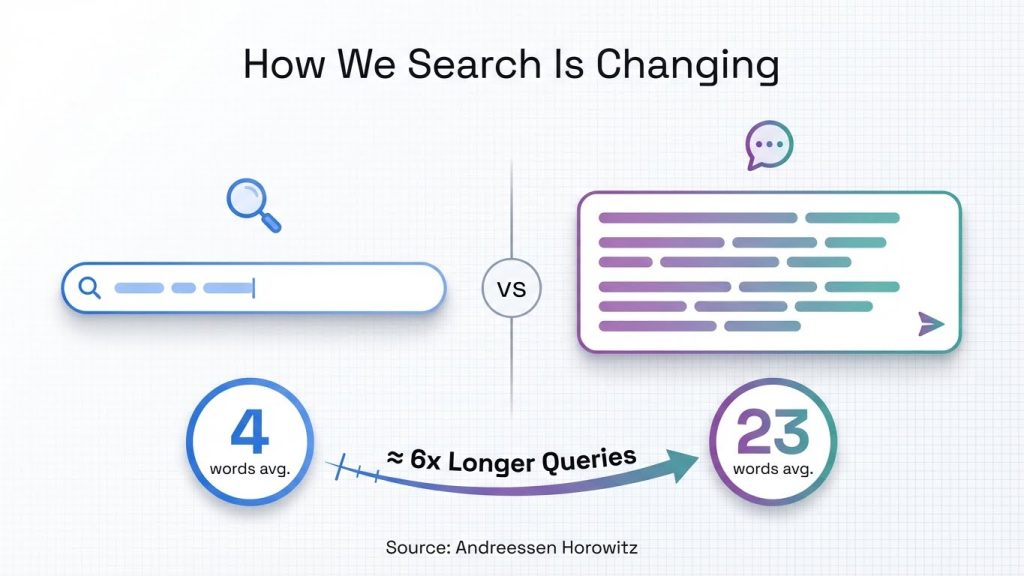
Traffic Predictions Are Sobering
Industry forecasts paint a stark picture:
- Gartner predicts traditional search engine volume will drop 25% by 2026, with AI chatbots and virtual agents capturing that share. [Source: Gartner]
- Organic search traffic is predicted to decrease by 50% or more as consumers embrace generative AI-powered search, according to Gartner’s extended forecast. [Source: Gartner]
- 58.5% of Google searches in the US already end without a click, rising to 75% on mobile. When AI Overviews are present, organic CTR drops by 61%. [Source: Seer Interactive]

The Business Impact Is Real
This isn’t theoretical—businesses are already feeling the effects:
- Early GEO adopters report that 32% of their sales-qualified leads now come from generative AI search, compared to virtually none just months ago.
- Traffic from AI platforms converts at significantly higher rates than traditional search, with some studies showing 5x higher conversion rates.
- Reddit and YouTube are among the most-cited sources in AI Overviews and ChatGPT responses, demonstrating that AI engines favor user-generated, discussion-rich content.
GEO vs SEO vs AEO: Understanding the Differences
Understanding the distinctions between these optimization approaches is critical for developing an effective strategy.
| Factor | Traditional SEO | Answer Engine Optimization (AEO) | Generative Engine Optimization (GEO) |
|---|---|---|---|
| Primary Goal | Rank in SERPs | Featured snippets, voice results | AI citations, brand mentions |
| Target Platforms | Google, Bing | Google Assistant, Alexa, Siri | ChatGPT, Perplexity, Claude, AI Overviews |
| Success Metrics | Position, CTR, traffic | Answer box presence, voice share | Citation rate, brand mentions, share of voice |
| Query Type | Short keywords (4 words avg.) | Question phrases | Conversational (23+ words avg.) |
| Content Format | Keyword-optimized pages | Q&A structured content | Comprehensive, authoritative resources |
| Link Building | Backlinks critical | Less emphasis | Authority signals across web |
| User Behavior | Click through to website | Receive voice answer | Get synthesized response, may not click |
| Measurement | Google Search Console, rank trackers | Featured snippet tracking | AI visibility platforms (Profound, Otterly) |
How Traditional SEO Works
Traditional SEO optimizes content to rank highly in search engine results pages. Success is measured by position, click-through rate, and organic traffic. The strategy revolves around keyword research, on-page optimization, technical SEO, and building backlinks to signal authority.
The fundamental unit of success is the click: users see your listing, click through to your website, and potentially convert. Your website is the destination.
How Answer Engine Optimization (AEO) Works
AEO emerged as voice assistants like Alexa, Google Assistant, and Siri gained adoption. The goal shifted from driving clicks to becoming the single answer to a user’s question—appearing in featured snippets, answer boxes, and voice search results.
AEO emphasizes question-and-answer formatting, structured data, and concise responses that voice assistants can read aloud. While still focused on Google’s ecosystem, AEO recognized that zero-click results were becoming more common.
How Generative Engine Optimization Works
GEO represents a more fundamental shift. Generative engines don’t return links—they synthesize information from multiple sources into cohesive, conversational responses. Your content must be:
- Discoverable by AI crawlers and retrieval systems
- Comprehensible to large language models parsing your content
- Authoritative enough to be selected over competing sources
- Extractable—structured so AI can pull relevant passages
- Citable—providing clear facts, statistics, and claims AI can reference
The metric that matters isn’t ranking—it’s reference rate: how often your brand or content is cited when AI systems generate responses in your domain.

How Generative AI Engines Process and Cite Content
Understanding how AI engines work under the hood helps explain why certain optimization strategies succeed.
The RAG Architecture
Most generative search engines use Retrieval-Augmented Generation (RAG), a two-stage process:
- Retrieval: The system searches an index (often web content, sometimes proprietary databases) to find relevant documents matching the user’s query.
- Generation: A large language model synthesizes the retrieved information into a coherent response, selecting which sources to cite.

This differs fundamentally from traditional search. Google’s algorithm ranks pages; generative engines read pages, extract information, and reformulate it. Your content doesn’t just need to rank—it needs to provide information the AI can understand, trust, and articulate.
What Makes AI Engines Cite Your Content
Research and industry experience suggest several factors influence whether AI systems cite specific sources:
Comprehensiveness: AI models favor content that thoroughly addresses topics. Single-keyword pages optimized for traditional SEO often lack the depth AI systems prefer.
Structural Clarity: Clear headings, logical organization, and explicit relationships between concepts help AI parse and extract information. Think of your content architecture as a knowledge graph.
Factual Specificity: Content with specific data points, statistics, quotes, and verifiable claims receives preferential citation. The Princeton GEO study found that adding statistics improved visibility by up to 40%. [Source: Aggarwal et al., 2023]
Source Attribution: Paradoxically, citing other credible sources within your content increases your likelihood of being cited by AI. It signals thoroughness and trustworthiness.
Entity Clarity: Clearly identifying who you are, what you do, and what topics you cover helps AI systems categorize and retrieve your content appropriately.
Cross-Platform Presence: AI engines assess authority holistically. Consistent information across Wikipedia, reviews, social media, industry publications, and your own site strengthens citation likelihood.
Core GEO Strategies: How to Optimize for AI Search
Moving from theory to practice, here are the essential strategies for improving your AI visibility.
1. Create Comprehensive, Authoritative Content
The Princeton research demonstrated that content depth matters more than keyword optimization for GEO success. AI systems are trained to recognize substantive, well-researched content.
Actionable tactics:
- Create definitive resources that answer not just the primary question, but anticipate follow-ups. If you’re writing about project management software, don’t just compare features—explain implementation, address common challenges, and provide selection frameworks.
- Include original data, research, and insights. First-hand experience signals authority that AI systems increasingly recognize. Share proprietary statistics, case study results, and expert perspectives unique to your organization.
- Address topics from multiple angles. Content that explores a subject comprehensively—pros/cons, use cases, alternatives, implementation—provides more extractable value than narrow treatments.
- Update content regularly. AI systems that access real-time information favor fresh, maintained resources over outdated pages.
2. Structure Content for AI Parsing
AI models excel at understanding relationships between concepts. Your content structure directly impacts retrievability.
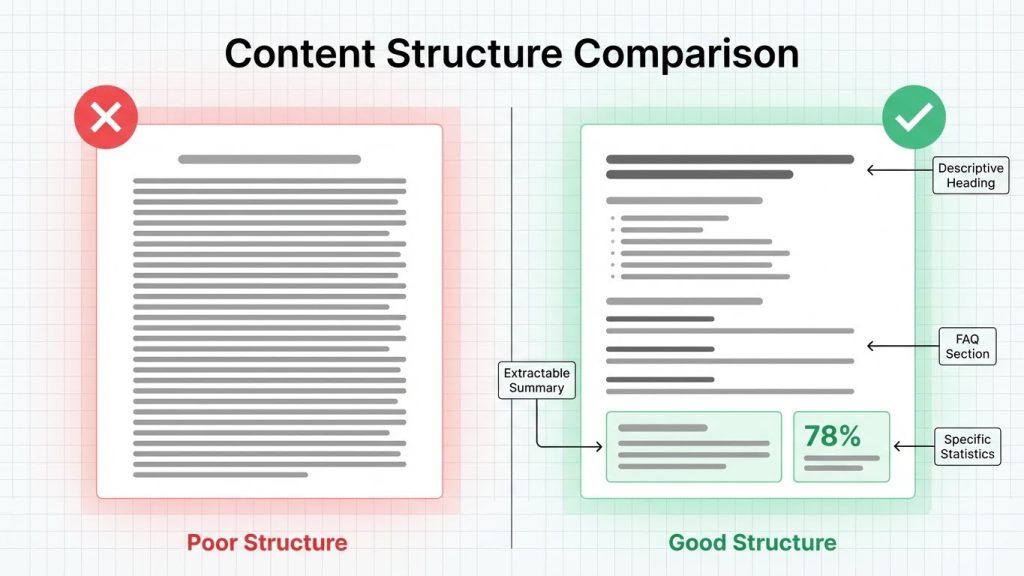
Actionable tactics:
- Use descriptive headings that clearly indicate what follows. Instead of “Our Approach,” use “How We Reduce Implementation Time by 40%.”
- Implement FAQ sections that directly answer common queries. These provide AI with ready-made question-answer pairs to cite.
- Create modular content blocks that work standalone. AI often extracts single passages—ensure each section provides complete, useful information independently.
- Use summary paragraphs at section openings that encapsulate key points. These serve as extraction targets for AI systems.
- Include glossaries and definitions for industry terms. When users ask “What is X?”, you want to be the cited definition.
- Apply schema markup extensively: FAQ schema, HowTo schema, Article schema, Organization schema, and Product schema all help AI understand your content’s structure and purpose.
3. Build Entity Authority and Brand Signals
AI engines assess credibility across your entire digital presence, not just your website.
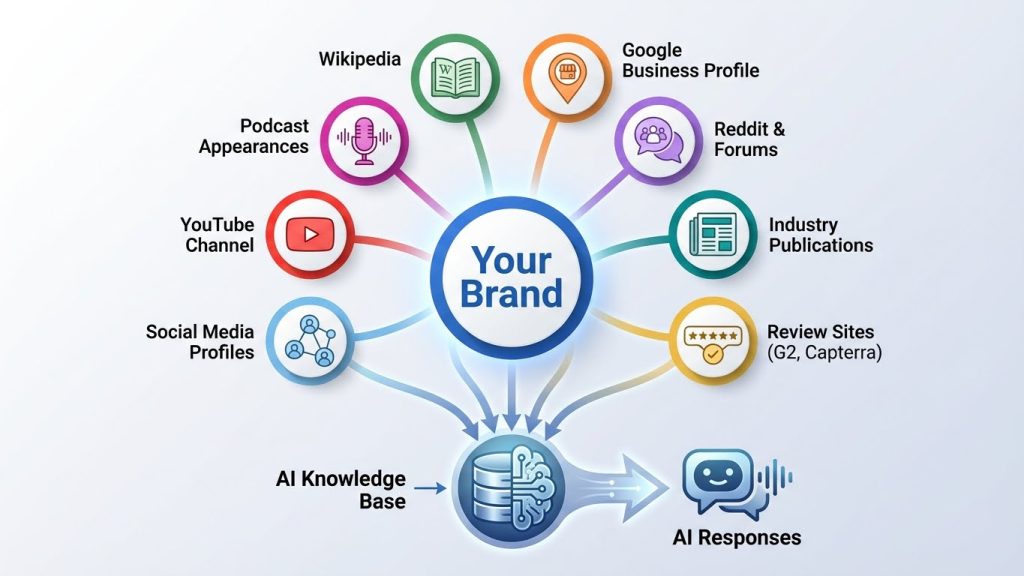
Actionable tactics:
- Ensure your Wikipedia presence (if notable) or Wikipedia mentions are accurate. Wikipedia is among the most-cited sources in AI responses.
- Claim and optimize Google Business Profile and knowledge panel information.
- Maintain consistent NAP (Name, Address, Phone) across all platforms.
- Build presence in authoritative industry publications. Guest posts, expert commentary, and research contributions in respected venues increase your entity’s authority.
- Participate meaningfully in Reddit, Quora, and industry forums. These platforms are heavily cited by AI systems. Genuine expertise shared in community discussions often surfaces in AI responses.
- Earn mentions and backlinks from high-authority domains—government sites (.gov), educational institutions (.edu), major publications, and industry leaders.
4. Implement Technical GEO Best Practices
Technical factors remain important for AI discoverability.
Actionable tactics:
- Ensure content is crawlable and indexable. AI systems often use web crawling to build retrieval indices. Blocked pages won’t be cited.
- Implement structured data (JSON-LD schema) to provide explicit context. This helps AI understand content type, author credentials, publication dates, and relationships.
- Maintain fast page load speeds. When AI does drive referral traffic, user experience matters for brand perception.
- Use clean, semantic HTML. Proper heading hierarchy, semantic tags, and accessible markup help AI parsers understand content structure.
- Monitor your AI crawler logs. Tools like Profound track when AI bots visit your site, helping you understand which content AI systems are indexing.
- Consider AI-specific meta descriptions that summarize your page’s key claims in extractable format.
5. Leverage Citations and External Validation
The Princeton research found that Cite Sources was among the top-performing GEO strategies. External validation strengthens your content’s citation worthiness.
Actionable tactics:
- Cite credible sources within your content. Academic research, government data, and authoritative industry reports signal thoroughness.
- Include expert quotes from recognized voices in your field. AI systems often extract quotations as evidence.
- Reference specific studies, statistics, and data points with clear attribution. Vague claims get overlooked; specific, cited claims get cited themselves.
- Build case studies with quantified results. “Increased revenue by 47% over 6 months” is more extractable than “significantly improved performance.”
- Earn reviews and testimonials on third-party platforms. Aggregate sentiment across review sites influences how AI characterizes your brand.
6. Optimize for Conversational Queries
Remember: AI queries average 23 words compared to 4 for traditional search. Your content must match how people actually ask AI for help.
Actionable tactics:
- Research question-based keywords using tools that reveal conversational queries. What are users asking AI about your industry?
- Create content that answers compound questions: “What’s the best CRM for small businesses that integrates with Gmail and has good mobile support?”
- Use natural language throughout. Write as if explaining to a colleague, not stuffing keywords.
- Address intent comprehensively. AI queries often combine informational and commercial intent—users want to understand and decide simultaneously.
- Include comparison content that helps AI answer “vs.” questions: “Slack vs. Teams for remote teams” type queries.
GEO Case Studies: Real Results from Real Brands
Case Study 1: How Zapier Increased AI Visibility Through Content Structure
Zapier, the automation platform, noticed declining organic traffic coinciding with AI Overview expansion. Their response exemplifies effective GEO strategy.
The approach: Zapier restructured existing content to feature clear, extractable summaries at the beginning of each integration guide. They added specific statistics about time saved and added FAQ sections addressing common follow-up questions.
The results: Within three months, Zapier’s content began appearing in AI-generated responses for automation-related queries. Their brand mentions in ChatGPT responses for “workflow automation” queries increased substantially, driving qualified traffic despite fewer traditional SERP clicks.
Key insight: They didn’t create new content—they restructured existing authority for AI comprehension.
Case Study 2: E-commerce Brand Visibility Transformation
A mid-sized e-commerce retailer in the outdoor equipment space found themselves invisible in AI shopping queries, despite strong traditional SEO rankings.
The challenge: When users asked ChatGPT for “best backpacking tents under $400,” competitors were consistently cited while they weren’t mentioned.
The approach: The team implemented comprehensive comparison content with specific product statistics, published video reviews to YouTube with detailed descriptions, engaged authentically in Reddit’s r/CampingGear community, and ensured product information was consistent across their site, Amazon listings, and review platforms.
The results: After six months, their brand began appearing in ChatGPT Shopping results. More importantly, the traffic arriving from AI-referred visitors showed significantly higher conversion rates than traditional organic traffic—these users arrived pre-informed and ready to purchase.
Key insight: AI visibility required presence across multiple platforms, not just on-site optimization.
Common GEO Mistakes to Avoid
As organizations rush to implement generative engine optimization, several pitfalls have emerged:
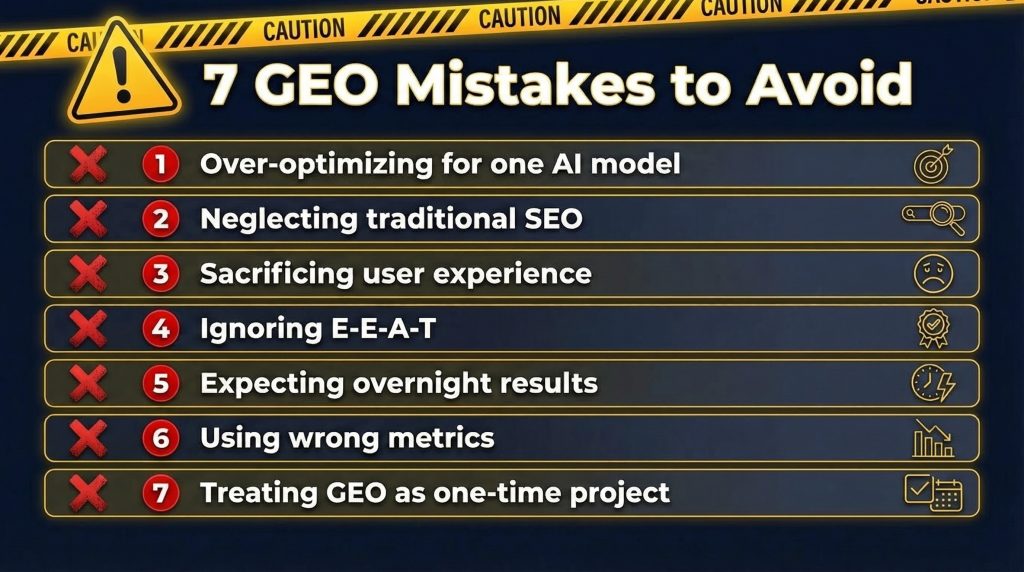
1. Over-Optimizing for Specific AI Models
Each AI model has nuances, but gaming one platform risks missing broader opportunities. Perplexity’s citation patterns differ from ChatGPT’s, which differ from Google’s AI Overviews. Focus on universal principles—comprehensive, authoritative content structured for AI comprehension—rather than exploiting temporary patterns in any single system.
2. Neglecting Traditional SEO
GEO supplements rather than replaces traditional SEO. Many AI systems still rely on web crawling, indexing, and traditional authority signals. Pages that rank poorly in Google often struggle in AI citations too. Maintain SEO fundamentals while layering GEO strategies on top.
3. Sacrificing User Experience for AI Optimization
Content overly structured for AI extraction—endless bullet points, robotic phrasing, repetitive formatting—frustrates human readers who find it through any channel. Balance AI comprehension with human readability. The best GEO content works for both audiences.
4. Ignoring E-E-A-T Principles
Google’s Experience, Expertise, Authoritativeness, and Trustworthiness principles matter even more in GEO. AI models are increasingly sophisticated at identifying authoritative sources and filtering low-quality content. Building genuine expertise—demonstrated through original research, expert credentials, and consistent thought leadership—remains essential.
5. Expecting Overnight Results
Unlike traditional SEO where ranking changes can occur within weeks, AI visibility builds over time as models are updated and retrained. GEO is a long-term investment. Organizations that maintain consistent efforts over 6-12 months see compounding returns as their content becomes established in AI knowledge bases.
6. Measuring with Wrong Metrics
Traditional SEO metrics—rankings, organic traffic, keyword positions—only partially capture GEO success. A page might generate significant brand influence through AI citations without driving direct traffic. Implement GEO-specific measurement including citation frequency, brand mention tracking, and sentiment analysis in AI responses.
7. Treating GEO as One-Time Optimization
AI platforms continuously update their models, retrieval systems, and citation patterns. What works today may be less effective tomorrow. Build systems for ongoing monitoring and optimization rather than treating GEO as a one-time project.
Best GEO Tools for 2026
The GEO tools market has matured rapidly. Here’s what’s available:
Free GEO Tools
Geoptie GEO Audit: Analyze your website’s AI readiness with comprehensive scoring across content structure, citation worthiness, and technical factors.
HubSpot AI Search Grader: Free assessment of your brand’s AI visibility across ChatGPT, Perplexity, and Gemini. Provides competitive benchmarking and actionable recommendations. Best for initial baseline measurement. [Source: HubSpot]
Manual Testing: Query ChatGPT, Perplexity, Claude, and Google’s AI Mode with searches relevant to your business. Document how your brand appears (or doesn’t) and track changes monthly.
Paid GEO Platforms
Geoptie Pro: Complete GEO platform including rank tracking across AI engines, content optimization recommendations, and competitor monitoring. Integrates with existing SEO workflows for unified reporting.
Profound: Enterprise-grade platform tracking brand citations across 9+ AI engines. Connects to Google Analytics for revenue attribution, showing how AI citations translate to business outcomes. Starts at $499/month. [Source: Profound]
Semrush AI Visibility Toolkit: Part of Semrush’s broader SEO suite, offering AI search market analysis, brand sentiment tracking, and competitive share-of-voice reporting. Priced at $99/month per domain. Strong for teams already using Semrush. [Source: Semrush]
Otterly.AI: Focused on prompt-level tracking and link citation detection. Monitor specific queries to see when your brand appears in AI responses. Plans start at $29/month. Best for teams focused on specific query visibility. [Source: Otterly.AI]
AthenaHQ: Combines prompt tracking, brand monitoring, competitive benchmarks, and an action center for fixing visibility gaps. Good for mid-market teams wanting guided optimization.
Geoptie Keyword Finder: Discover which queries your audience asks AI platforms, identifying content gaps and optimization opportunities.
How to Measure GEO Success
Traditional SEO metrics don’t fully capture GEO performance. Here’s what to track:
Key GEO Metrics
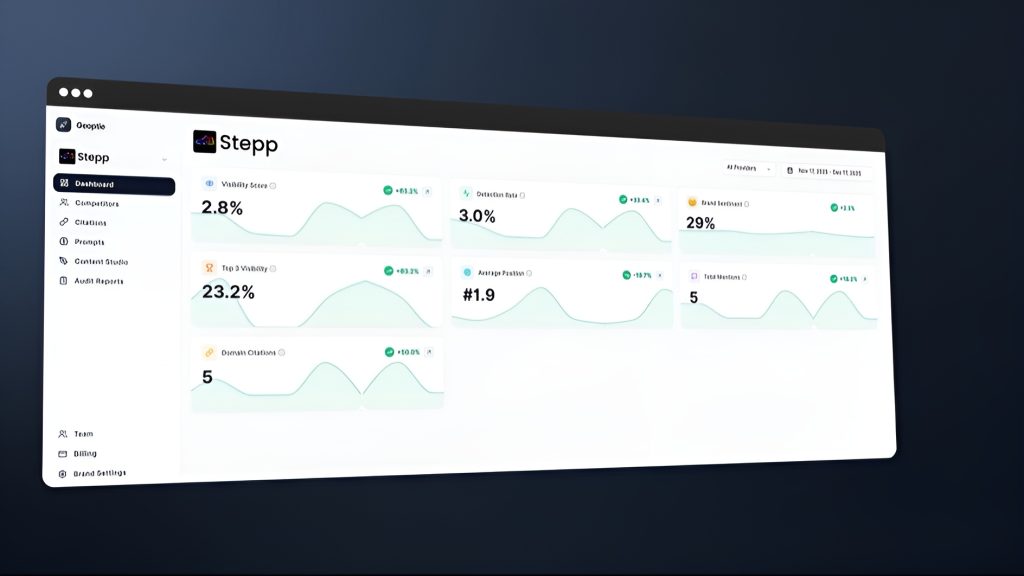
Citation Frequency: How often AI systems cite your content in relevant queries. This requires systematic testing or dedicated tools.
Brand Mention Rate: Percentage of AI responses in your category that mention your brand, regardless of citation links.
Share of Voice: Your brand’s mention frequency compared to competitors in AI responses for target queries.
Sentiment Analysis: How positively or negatively AI platforms characterize your brand when mentioning it.
Citation Position: Where in AI responses your content appears—early mentions carry more weight than afterthoughts.
Response Inclusion Rate: Percentage of relevant queries where your content influences the AI’s response.
Indirect Indicators
Branded Search Volume: Increases in users searching your brand name directly, suggesting discovery through AI responses.
Direct Traffic Growth: Users who heard about you through AI may type your URL directly rather than clicking a citation.
Referral Traffic from AI Platforms: Monitor Google Analytics for traffic from chat.openai.com, perplexity.ai, and similar sources.
Conversion Rate Changes: AI-referred traffic often converts at higher rates—users arrive pre-informed. Track whether conversion rates shift as AI visibility improves.
GEO Measurement Tools
Geoptie GEO Rank Tracker: Automated monitoring of your brand’s position across major AI platforms. Track changes over time and set alerts for significant movements.
Manual Query Testing: Test your top 30-50 queries monthly across ChatGPT, Perplexity, Google AI Overviews, and Claude. Document citations and brand mentions.
GA4 Integration: Configure Google Analytics to segment AI-referral traffic. Analyze behavior, conversion, and value metrics for this audience specifically.
The Future of Generative Engine Optimization
Emerging Trends
Multimodal Optimization: Future AI engines will seamlessly blend text, images, video, and audio. GEO strategy will need to encompass optimization across all content formats—ensuring your YouTube videos, podcast episodes, and infographics are discoverable and citable alongside text content.
AI Shopping Integration: ChatGPT’s Shopping feature and similar integrations are transforming product discovery. E-commerce brands must optimize product data, imagery, and descriptions for AI shopping interfaces specifically.
Agentic AI: The rise of autonomous AI agents that take actions (booking, purchasing, researching) on users’ behalf creates new optimization challenges. Your content may need to serve AI agents working on behalf of users, not just users directly.
Personalization: Advanced AI models will provide increasingly personalized responses based on user history, preferences, and context. GEO strategies may need to account for how content performs across different user segments.
Predictions for 2026-2027
AI search parity: Based on current growth trends, AI-driven search could deliver equal or greater economic value than traditional search by late 2027, even with lower raw volume, due to higher conversion rates. [Source: Multiple industry analysts]
Platform diversification: Apple’s integration of AI-native search engines like Perplexity into Safari signals the end of Google’s distribution monopoly. Brands will need visibility across an increasingly fragmented AI search landscape.
Measurement standardization: As the GEO market matures, standardized metrics and benchmarks will emerge, making it easier to measure and compare performance.
Traditional SEO integration: The distinction between SEO and GEO will blur as Google’s AI Overviews become the dominant SERP feature. Optimization strategies will need to address both paradigms simultaneously.
Regulatory attention: As AI search influences consumer decisions, expect increased scrutiny of how AI systems select and cite sources, potentially creating new requirements for transparency.
Getting Started with GEO: Your Action Plan
Ready to implement generative engine optimization? Here’s your step-by-step checklist:
Week 1: Baseline Assessment
- [ ] Test your brand visibility manually across ChatGPT, Perplexity, Claude, and Google AI Overviews for your top 20 queries
- [ ] Run a free GEO audit with Geoptie to assess your website’s AI-readiness
- [ ] Document current brand mentions, citation frequency, and sentiment
- [ ] Identify which competitors appear in AI responses where you don’t
Week 2-3: Content Audit
- [ ] Review existing content through a GEO lens—which pieces comprehensively answer user questions?
- [ ] Identify gaps in topical coverage that prevent AI systems from citing you as authoritative
- [ ] Flag high-performing SEO content that could be restructured for better AI extraction
- [ ] Prioritize 5-10 pages for initial optimization
Week 4-6: Optimization Sprint
- [ ] Restructure priority content with clear headings, FAQ sections, and extractable summaries
- [ ] Add statistics, citations, and expert quotes to strengthen content authority
- [ ] Implement schema markup for articles, FAQs, and organization information
- [ ] Ensure cross-platform consistency (website, Google Business Profile, social profiles, Wikipedia)
Month 2-3: Authority Building
- [ ] Develop original research or data that provides unique, citable insights
- [ ] Engage authentically in relevant Reddit communities and industry forums
- [ ] Pursue guest posts and mentions in authoritative industry publications
- [ ] Build case studies with quantified results
Ongoing: Measurement and Iteration
- [ ] Set up Geoptie GEO Rank Tracking for automated monitoring
- [ ] Test queries monthly and document changes
- [ ] Track indirect metrics (branded search, direct traffic, conversion rates)
- [ ] Iterate based on what content gets cited and why
Frequently Asked Questions About GEO
Generative engine optimization (GEO) is the practice of optimizing digital content to appear in AI-generated search responses from platforms like ChatGPT, Perplexity, Claude, and Google’s AI Overviews. Unlike traditional SEO which focuses on ranking in search results, GEO ensures your brand is cited when AI systems synthesize information to answer user queries.
SEO optimizes content to rank highly in traditional search engine results pages (SERPs), driving clicks to your website. GEO optimizes content to be cited in AI-generated responses. SEO success is measured by rankings and traffic; GEO success is measured by citation frequency and brand mentions in AI answers. Both remain important—GEO supplements rather than replaces traditional SEO.
To optimize for ChatGPT and similar AI engines: create comprehensive, authoritative content that thoroughly addresses topics; use clear structure with descriptive headings; include specific statistics, data, and citations; implement FAQ sections; ensure consistency across your web presence; and build authority through mentions on Wikipedia, Reddit, and authoritative publications.
No. GEO and SEO work together. Many AI systems still rely on traditional search indices and authority signals. Content that ranks well in Google often performs better in AI citations. Maintain SEO fundamentals while adding GEO-specific optimizations for comprehensive visibility.
GEO typically takes longer than traditional SEO to show results. AI models are updated periodically rather than continuously crawling, so visibility improvements may take 3-6 months to materialize. However, once established, AI visibility tends to be more stable than search rankings.
For free assessment, try Geoptie’s GEO Audit or HubSpot’s AI Search Grader. For ongoing tracking, Geoptie Pro, Profound, Semrush AI Toolkit, and Otterly.AI offer comprehensive monitoring. For enterprise needs with revenue attribution, Profound leads the market.
Track citation frequency across AI platforms, brand mention rate, share of voice versus competitors, and sentiment in AI responses. Also monitor indirect indicators: branded search volume, direct traffic, AI referral traffic in Google Analytics, and conversion rate changes.
Yes. With ChatGPT serving 800+ million weekly users and AI Overviews appearing in 15-60% of Google searches, AI-driven discovery is already mainstream. Early GEO adopters report 32% of qualified leads coming from AI search. As traditional organic traffic continues declining, GEO investment becomes increasingly critical for visibility.
Comprehensive guides, FAQ pages, glossaries, comparison articles, and content with specific statistics perform well. User-generated content platforms like Reddit and YouTube are heavily cited by AI. Original research and case studies with quantified results also earn strong citations.
AI engines using RAG (Retrieval-Augmented Generation) first retrieve relevant documents, then generate responses citing selected sources. Factors influencing citation include content comprehensiveness, structural clarity, factual specificity with verifiable data, source credibility, and consistency across platforms.
Conclusion
Generative Engine Optimization represents the most significant shift in digital marketing since Google’s inception. As AI-powered search tools become the primary way people discover information, businesses that master GEO will have a substantial competitive advantage.
The data is clear: ChatGPT’s 800+ million weekly users, Perplexity’s 780 million monthly queries, and Google AI Overviews appearing in up to 60% of searches signal that the transition is already happening. Traditional search traffic is projected to drop 25% by 2026, with AI capturing that share.
But this shift also presents opportunity. Early movers in GEO are already seeing results—higher-converting traffic, stronger brand perception, and visibility where their competitors are invisible. The brands that establish authority in AI responses today will own the conversations in their industries tomorrow.
The fundamentals of GEO—comprehensive content, clear structure, factual specificity, and cross-platform authority—align with creating genuinely valuable resources for your audience. It’s not about gaming algorithms; it’s about becoming the definitive source that AI systems should cite.
The revolution is here. Start optimizing for generative engines today.

Ready to transform your content strategy for the AI era? Try Geoptie today and discover how generative engine optimization can amplify your digital presence. Our platform provides the insights and tools you need to track your AI visibility, audit your content’s readiness, and ensure your brand gets discovered and cited by AI-powered search engines.

![Generative Engine Optimization (GEO): The Definitive Guide [2026]](https://cms.geoptie.com/wp-content/uploads/2026/01/Concept_a_modern_2k_202601161507-scaled.jpeg)


